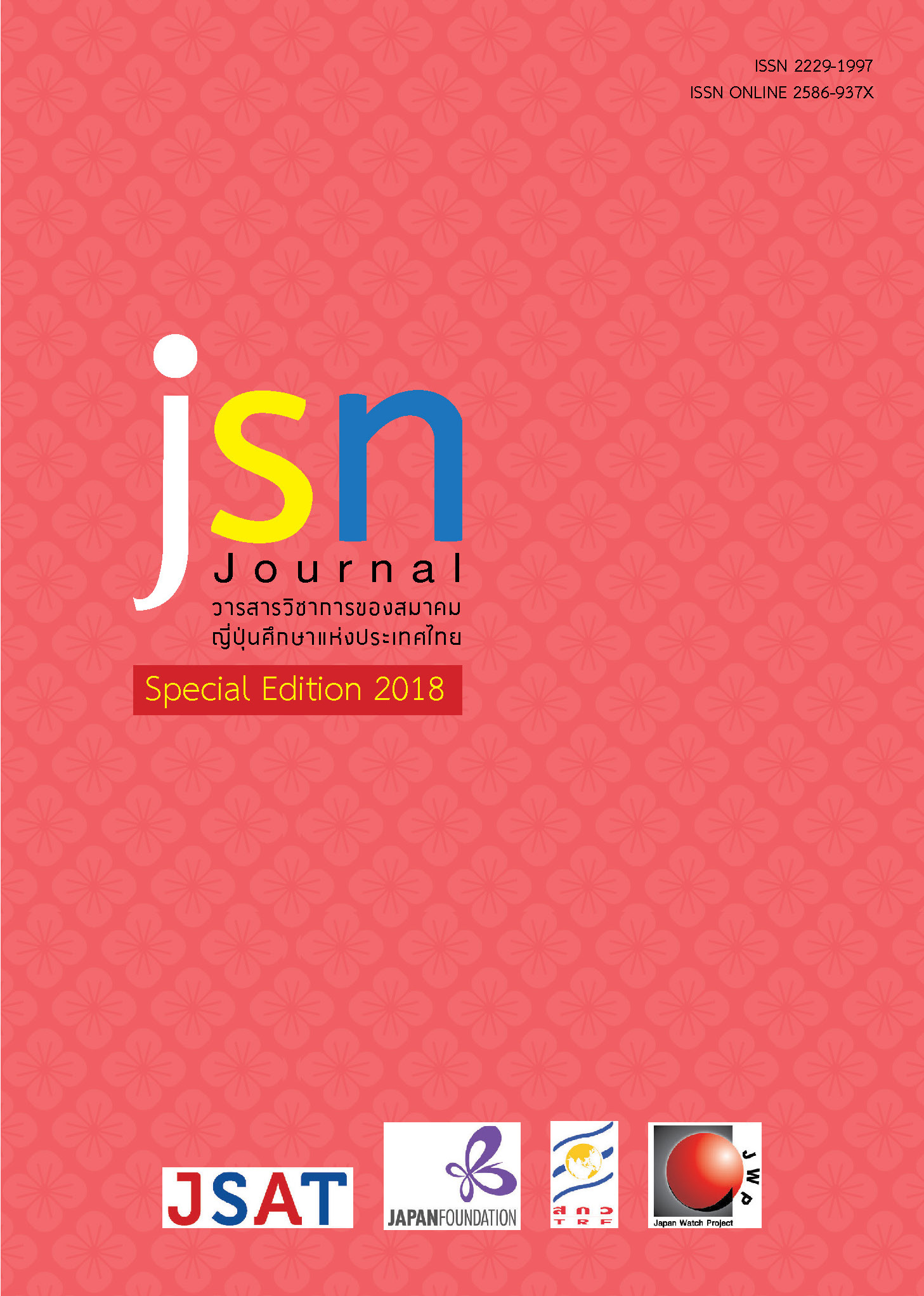The Male Protagonists in Haruki Murakami’s Nezumi Trilogy and His Attitude Towards Society
Main Article Content
Abstract
Haruki Murakami’s early literary works (in the 1970s and 1980s) represent fundamental characteristics of his unique writing style, and significantly differ from other Japanese novels, with the narrative trait of detachment 「デタッチメント」- a lack of interest in the surroundings and interaction with others. Murakami’s sense of social detachment is distinctively connected and reflected by male protagonists
in his early works since the first novel, 『風の歌を聴け』“Hear the Wind Sing” released in 1979. Murakami followed his first book with two sequels, 『1973年のピンボール』 “Pinball, 1973” (1980) and 『羊をめぐる冒険』“A Wild Sheep Chase” (1982). These three stand-alone novels are all together form “The Nezumi Trilogy(鼠三部)” or “The Trilogy of the Rat”, also known as 初期三部作 among readers and researchers in which commonly referred to Haruki Murakami’s initial three novels. This article aims to examine the male rotagonists in three stories of The Nezumi Trilogy because they are obviously consisted of the same characters, namely “I”「僕 - boku」 and “Nezumi「鼠」” or “Rat”. The three stories are also interconnected by coherent incidents and remain unresolved conflicts till the end. The findings indicate that The Nezumi Trilogy depicts a man who struggles with intrapsychic conflicts and is extremely passive to free himself from the situation. By the end of the three novels, the male protagonists neither attempt to find solutions nor interact socially with other characters. It therefore appears to align with Haruki Murakami’s attitude towards social detachment.
Article Details
ข้อความและข้อคิดเห็นต่างๆ ในบทความเป็นของผู้เขียนบทความนั้นๆ ไม่ใช่ความเห็นของกองบรรณาธิการหรือของวารสาร jsn Journal
References
กำจร หลุยยะพงศ์ อ้างถึงใน ณรงค์กรรณ รอดทรัพย์. (2555). ปิตาธิปไตย : ภาพสะท้อนแห่งความไม่เสมอภาคระหว่างชายหญิงในสังคมเอเชีย. กรุงเทพฯ : วารสารวิชาการมหาวิทยาลัยราชภัฏบุรีรัมย์ ปีที่ 4 ฉบับที่ 2
ยศ สันตสมบัติ. (2550). ฟรอยด์และพัฒนาการของจิตวิเคราะห์ : จากความฝันสู่ทฤษฎีสังคม. กรุงเทพฯ : สำนักพิมพ์มหาวิทยาลัยธรรมศาสตร์ พิมพ์ครั้งที่ 4
ไชยันต์ ไชยพร. (2550). POSTMODERN IN JAPAN. กรุงเทพฯ : สำนักพิมพ์openbooks.
A.K.Byron. (2017). Rethinking the Rat Trilogy : Detachment,Commitment and Haruki Murakami’s Politics of Subjectivity. New Voices in Japanese Studies Vol.9
Michael Emmerich. (2014). Haruki Murakami, East Asia,World Literature. Waseda Rilas journal no.2
加藤典洋.(2014).『68年後の村上春樹と東アジア』 Waseda Rilas journal no.2
加藤典洋. (1997). 『村上春樹 イエローページ』 講談社、第12刷
千野拓政. (2014). 『村上春樹と東アジア文化圏』 Waseda Rilas journal no.2
樋口智子. (2008).『村上春樹「世界の終わりとハードボイルド・ワンダーランド」論―初期三 部作から「ノルウェイの森」へ―《僕》の進化の物語』お茶の水女子大学国語国文学会第109号
村上春樹. (2015).『職業としての小説家』スイッチ・パブリッシング、第1刷
村上春樹. (2014).『村上春樹全作品1979₋1989①』講談社、第10刷
村上春樹. (2008).『村上春樹全作品1979 - 1989②』講談社、第7刷
村上春樹.河合隼雄. (2016). 『村上春樹、河合隼雄に会いに行く』新潮社、第28刷


